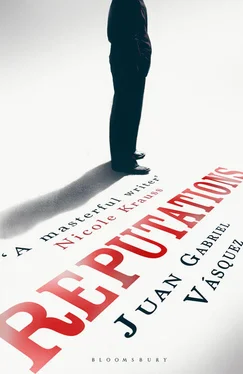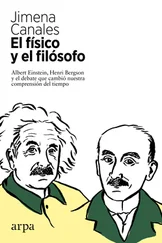‘Don’t ever die, Mallarino!’ shouted a woman’s voice from somewhere in the front rows, possibly to his left, and Mallarino came out of his reverie. The voice that shouted was a mature voice, perhaps worn by cigarettes, perhaps by a lifetime of shouting out in theatres, and her peremptory tone was immediately celebrated by the audience with loud laughter. ‘Never!’ shouted someone at the back. Mallarino feared for a second that the tribute was going to turn into a political rally.
‘Ricardo Rendón, my master,’ he hurried to say, ‘once compared the caricature to a stinger, but dipped in honey. I have that phrase mounted above my desk, more or less the way a sailor has a compass. A stinger dipped in honey . The identity of the caricaturist depends on the measures he uses of the two ingredients, but both ingredients always have to be there. There are no political cartoons that don’t sting, and none without honey. There’s no caricature if there’s no subversion, because every memorable image of a politician is by nature subversive: it throws the solemn man off balance and reveals the impostor. But there’s no cartoon either if it doesn’t bring a smile, even if it’s a bitter smile, to the reader’s face. .’ Mallarino was saying this when his marooned gaze found Magdalena’s eyes, with those slender eyebrows that only arched like that, the way they were arched now, when Magdalena was really paying attention: she was one of those women who could not feign interest, not even flirtatiously. A sudden urgency invaded him, a brutal desire to get down off the stage and be with her, to hear that voice that wasn’t of this world, to speak in whispers with the past.
Mallarino furrowed his brow (again the buffoon, he thought, again playing a part) and leaned in close to the microphone. ‘I would like to finish off,’ he said, ‘by remembering a certainty we often forget: life is the best caricaturist. Life turns us into caricatures of ourselves. You have, we all have, the obligation to make the best caricature possible, to camouflage what we don’t like and exalt what we like best. You’ll understand that I’m not just talking about physical attributes, but of the mysterious traces life leaves on our features, the moral landscape, if you will, that’s the only thing to call it, that moral landscape that gets drawn on our face as life goes by, as we go along making mistakes or getting things right, as we wound others or strive not to, as we lie or deceive or persist, sometimes at the cost of great sacrifices, in the ever difficult task of telling the truth. Many thanks.’
The newspapers on the following day contained a litany of hackneyed praise. APOTHEOSIS IN THE COLÓN, was El Tiempo’s headline in the culture section and El Espectador kept the matter on the front page: JAVIER MALLARINO GOES DOWN IN HISTORY, it read, the words floating over a grainy black-and-white photo with sharp contrasts, taken from a low angle by a good student of Orson Welles. That’s what Mallarino said: ‘A good student of Orson Welles.’ Magdalena, whose face was emerging unhurriedly from sleep, the delicate muscles moving and settling in her forehead and her cheeks and her grin, all filling up with expression as a clay mask takes shape as it dries, looked at the image of Mallarino speaking behind the lectern with his arms open wide, and gave her opinion that if the photographer was thinking of Citizen Kane , the subject was thinking of Titanic . Leaning back on a disorderly pile of pillows, Mallarino could only wonder how they had ended up here, in his house in the mountains, waking up together and naked in the same bed as they hadn’t done for several lifetimes, and each keeping a careful silence: not the habitual, daily silence, but the apprehensive silence people keep in order not to break — with clumsiness, with an inopportune question, with a sarcastic comment — the fragile equilibrium of reunions. Was this a reunion? The word was heavy on the tongue, like a flavour stuck there from the last meal: no, they mustn’t talk about what had happened, mustn’t commit that beginner’s error. They talked about other things: her work at the university radio station, the musical programme she’d been producing and presenting for the last few years, so agreeable because she never had to fight with any living people, with their vanities and pretensions. Magdalena recorded her programme in a small studio with ochre walls, and in that fictitious solitude (because on the other side of the glass was the sound technician, and behind the technician, the noise of the world) she read the text that she herself, often with the help of those who knew more, had written. The stories of the songs, that’s what Magdalena’s programme was about: telling people who Jude and Michelle were, what misfortunes lay behind L’Aigle noir , what marital breakdown was referred to in Graceland . All this she told him now with her mouth hidden under the white duvet, protecting herself from the morning cold. It was cold, the house in the mountains: it would have been a scientific inaccuracy to say it was on the highland plateau, but it was close; if you went out for a walk, tall trees gradually disappeared and it wasn’t impossible to run into some frailejón plants. Mallarino also liked the idea of living up at those altitudes, and frequently used it to impress the gullible, even if it was an exaggeration: my house in the Bogotá highlands . He lifted the duvet to take a peek at Magdalena’s body, and she slapped it down making a tiny feather fly through the air.
‘Don’t start,’ she said, ‘I’ve got to get going.’
It was all strange: it was strange, in the first place, that Magdalena recognized how strange it all was, that she understood in the same way or seemed to understand, and the weight of her body in this bed was also strange, different from other bodies and curiously her own, and the familiarity was strange, the insolent familiarity they felt in spite of so many years of not being together, and, in particular, Mallarino’s capacity to anticipate Magdalena’s movements was very strange.
‘I’ve got a terrible day ahead of me,’ she said, ‘but let’s see each other tomorrow, shall we? I’ll take you out to lunch in town, so you don’t get out of the habit.’
‘Not in town,’ said Mallarino. ‘It makes our eyes water, us mountain folk.’
‘What a weakling,’ said Magdalena. ‘A little pollution never hurt anybody.’ And then: ‘Will you come and pick me up at the station?’ And then: ‘Let’s say one o’clock.’
Mallarino said OK, they’d have lunch in town tomorrow, that he’d pick her up at one at the station, that a little pollution never hurt anybody, and at the same time he was making private predictions: now she’ll roll over on her side, turning her back on him, looking nowhere, and now she’ll get out of bed in a single agile movement, slipping out without even pausing to sit on the edge and stretch, and now she’ll walk towards the bathroom without looking back, or rather allowing herself to be looked at, sure that Mallarino would be looking at her the way he was looking at her, comparing her body to the one he’d known years before and seeing the stretch marks on her hips and shadows on her buttocks and being jealous of them, because the shadows and stretch marks weren’t shadows and stretch marks, but messengers of all that had happened in his absence: all that Mallarino had missed. The night before had been like making love with a memory, with the memory of a woman, and not with the woman who was present, the way we keep feeling, after stepping barefoot on a stone, the shape of the stone in the arch of our foot. That’s what Magdalena was: a sharp reminder. He saw her close the bathroom door and knew (an uncomfortable knowledge as well as so satisfactory) that he wouldn’t see her come out again for a good quarter of an hour. And finding himself there, in front of a picture window looking out into the cloud forest, surrounded by papers filled with news of his triumph and waiting for his regained wife to come back to him, Mallarino felt a rare calm. He wondered if this was what happy people felt, and he was sure that it was a few hours later, after Magdalena had said goodbye with a kiss on the lips and he had been working on the next cartoon, when the dogs barked and the doorbell buzzed and Mallarino found himself with the young journalist from the previous evening, who had asked him for an interview for some blog he’d never heard of, and showing her into the living room and offering her something to drink he noticed, not without surprise, that he had not the slightest intention of seducing her.
Читать дальше












